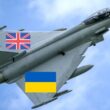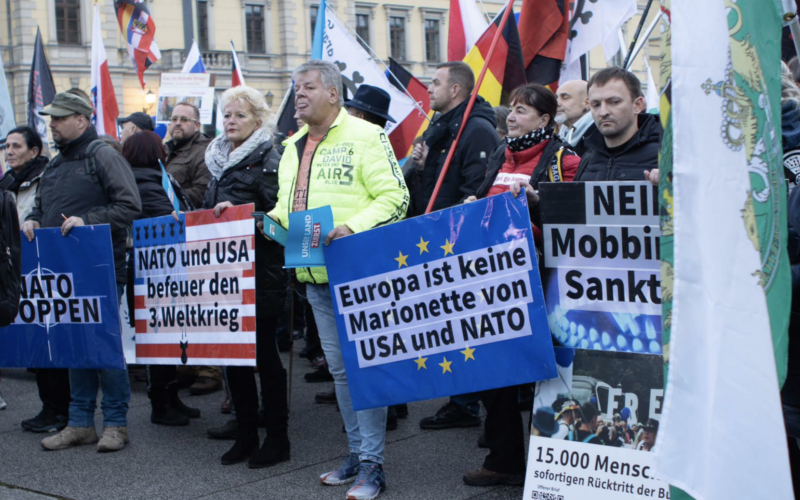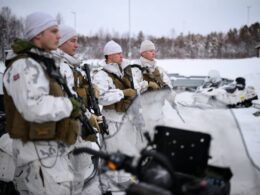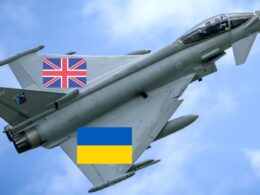The JFDA (Jewish Forum for Democracy and Against Anti-Semitism) has been monitoring various protest events and the spread of Pro-Russian Propaganda in Germany related to the Russian aggression against Ukraine since February 2022.
The Russian full-scale invasion of Ukraine has been the central theme of numerous protest events since February 2022. While many have expressed solidarity with Ukraine and identified Vladimir Putin and Russia as the main culprit, others have not shown sympathy. Anti-imperialist left-wing groups, peace activists, conspiracy ideological actors, pro-Russian initiatives, and German right-wing extremists have been observed spreading Russian propaganda and regarding the USA, NATO, or the entire West as actual aggressors.
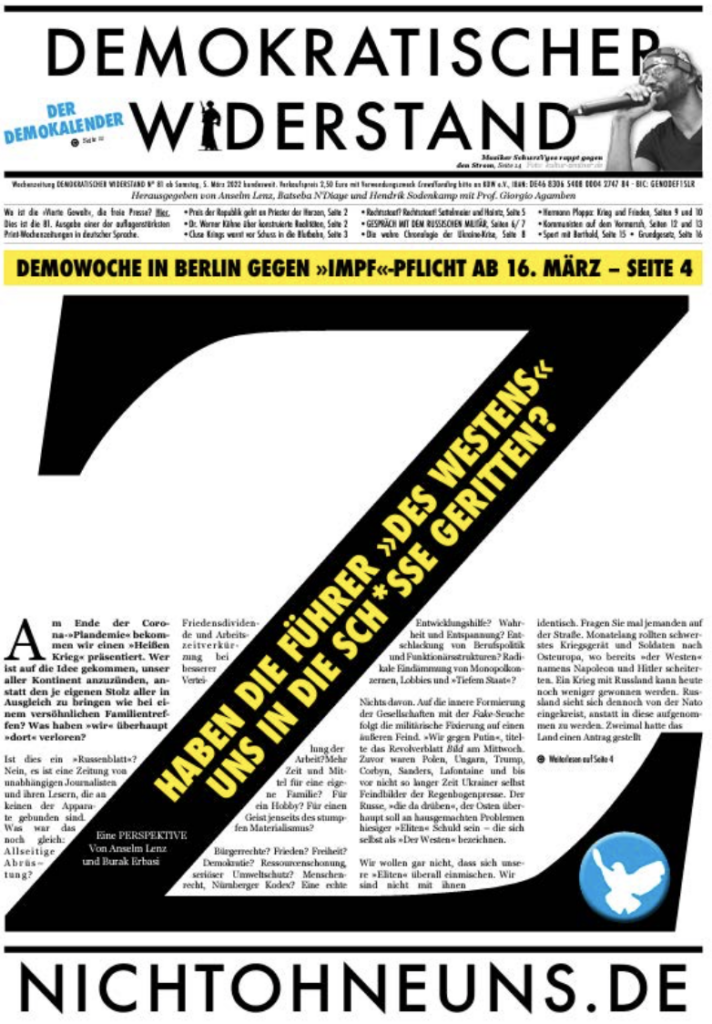
The influence of Russian disinformation and Putin’s ideology has been noticeable in posters, speeches, and slogans at protests. There have also been clear overlaps and connections with campaigns and individuals who have been engaged in the dissemination of Russian propaganda for years or decades. These included initiatives such as Stop Airbase Ramstein or musicians such as ÄON, Kilez More or Morgaine.
However, there have been hardly any mass protests, with only a few hundred people gathering at increasingly organized “peace festivals,” which looked more like daytime festivals than political demonstrations. Larger conspiracy-ideological demonstrations that had the war as the main theme remained the exception rather than the rule.
The German right-wing extremist scene has tried to make political profit from social crises by presenting themselves as a helping hand and in the process spreading their ideology. In many places, the AfD has coordinated demonstrations and tried to position itself as a peace party. Externally, the events were dedicated to topics such as inflation or the energy crisis. There are also different currents and opinions on the Ukraine war on the left or in the conspiracy ideology scene. This also applies to right-wing extremist groups.
Despite these alliances and various strategic adjustments, it is clear that special events can lead to large-scale demonstrations. On the occasion of the security conference, around 10,000 people from all over Germany gathered on Königsplatz on February 18, 2023, after the Munich Stands Up Alliance had called for protests. The Speakers included Diether Dehm (DIE LINKE) and former CSU politician Jürgen Todenhöfer. Both have been drawing attention to themselves for years with anti-American and anti-Western posts. At the same time, a pro-Russian demonstration also took place in Berlin, which showed solidarity with the actions in Munich. Both events clearly reflected Putin’s propaganda. In Berlin, for example, speaker Uli Gellermann emphasized that in the case of Russian action it was a question of “self-defense” and that the war in Donbass was solely aimed at “destroying Russians”
Several hundred people gathered in Berlin-Wedding for a “peace rally” organized by anti-imperialist left-wing groups such as SDAJ, Linksjugend Nord-Berlin or Young Struggle. The rally, held on the day of the Russian invasion of Ukraine, condemned the “rich and powerful” for their profit interests and blamed NATO and the US for the conflict. Surprisingly, the Russian President Putin’s name was not mentioned, and no responsibility was placed on Russia for the attack.
The speeches at the rally echoed the same sentiments. Rather than condemning the Russian invasion, speakers criticized the “imperialist NATO bloc,” the US, and even Israel, and pointed to a long history of Russian aggression. Solid Nord-Berlin declared the “main enemy” as the FRG or NATO and called for war against them.
Similar sentiments were echoed at other anti-imperialist protests and demonstrations in the following months, which often had a manageable turnout of two or three-digit participants. However, the annual Luxemburg-Liebknecht commemoration in January drew a broader alliance and saw the most concise and provocative slogan of the day: “Mali, Donbass, Gaza City finally alter the West!”
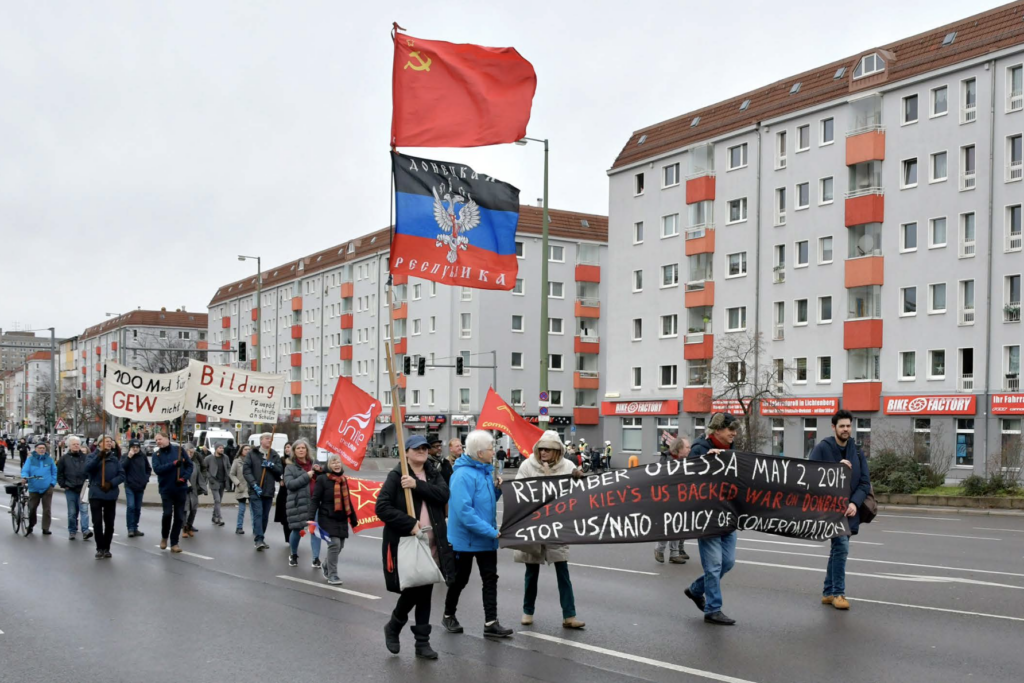
Now, a rally in Berlin on February 25, 2023, the day after the anniversary of the Russian attack, is being called for by a broad alliance led by Sahra Wagenknecht (DIE LINKE) and Alice Schwarzer (EMMA). The mobilization for the rally was initiated two weeks earlier by the “Manifesto for Peace,” which attracted several hundred thousand supporters on the change.org platform.
Common Enemy Images: US, NATO, and “The Powerful”
Whether anti-imperialist leftists, conspiracy theorists, or right-wing extremists, they all share a common enemy: the US, which, with the support of NATO, is seen as responsible for the conflict in Ukraine. Meanwhile, Russia is either portrayed as a victim or not mentioned at all, and Ukraine is not viewed as an acting subject.
This worldview often leads to the Russian invasion of Ukraine being relativized and not seen as an attack but a reaction to the West’s imperialist striving, especially the US. This simplification of the world into good and bad and the personalization of social processes serves a regressive critique of capitalism that provides a breeding ground for anti-Semitic resentment.
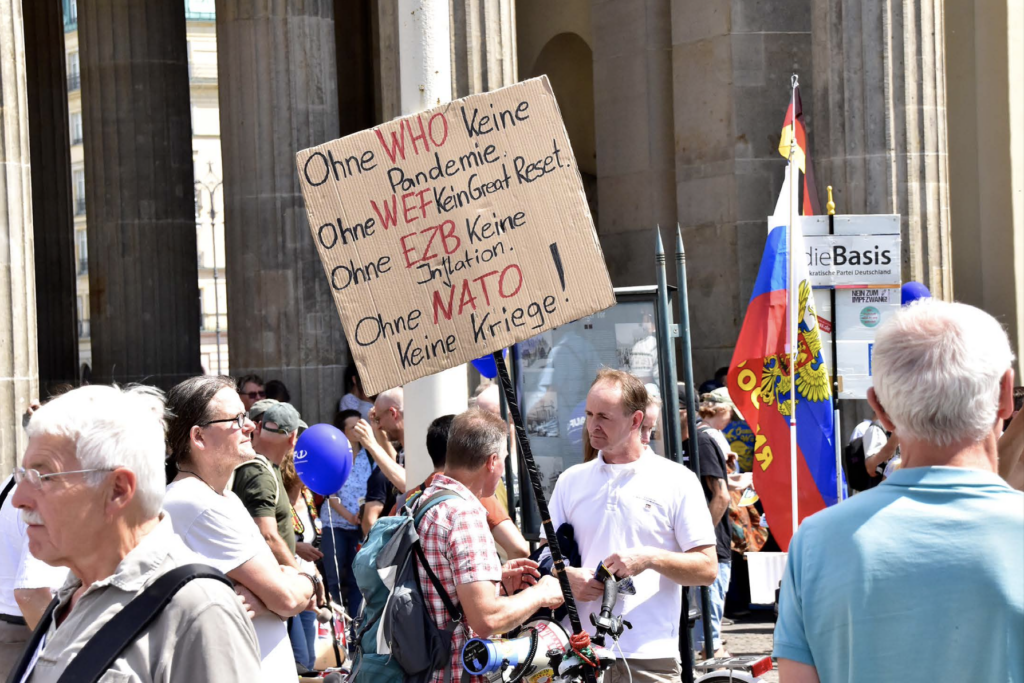
The simplification of the world and personalization of social processes are also central elements of conspiracy ideology. This is why the narratives of anti-imperialist and conspiracy-ideological protests in the context of the Ukraine war overlap, and the same enemy images are addressed. However, anti-Semitic codes are typically used in conspiracy-ideological protests, reproducing narratives blaming Jews as scapegoats for societal crises.
Meanwhile, right-wing extremist groups combine a belief in conspiracies and anti-Americanism with a folkish-nationalistic worldview that strives for a homogeneous people with a common origin, culture, and language. They view the Ukraine conflict as a proxy war between two different groups, with the self-proclaimed “patriotic peace forces” opposing the US and NATO.



